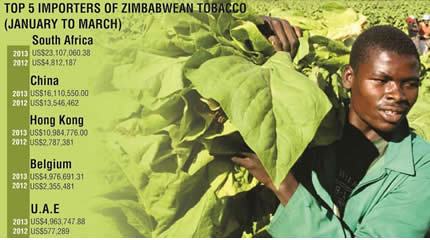
Zimbabwe's three tobacco auction floors are facing an uncertain future following indications that farmers are turning to contract growing, which offers higher returns.
Last week, it also emerged that buyers are offering low prices at the auction floors, alleging that most self-financing farmers are using banned tobacco treatment chemicals that compromise crop quality.
However, not convinced by the arguments, farmer representatives contend that contractors are actively seeking to undermine the auction system in order to dominate the market.
Available statistics show that 70 percent of the 104 737 growers registered this season opted for the contract system.
At least 60 percent of those registered last season also took the same route.
Comparatively, the figures appear to suggest a significant shift from the once dominant auction system to contract growing.
The three auction floors — Boka, Premier and Tobacco Sales — are each entitled to a payment of 2,5 percent of the total value of tobacco sold at their respective stations. A declining farmer base would, therefore, affect them directly.
In the past, most growers ventured into contract farming largely because of lack of capital. However, many self-financing farmers are now contemplating moving towards the allure of contractors who continue to offer competitive prices.
Auction floors have been stuck with a ceiling price of US$4,99 per kilogramme over the last three seasons whereas contractors have ensured prices remain well above this ceiling.
The contractors are the same buyers who purchase the crop at auction floors.
This continues to raise suspicions that they collude not to exceed the highest bid, in this case US$4,99.
Contract farming was introduced in 2004, just a year after the Agricultural Development Bank (Agribank) and other financial institutions (that used to assist farmers with funding), were placed under economic sanctions.
Government approached tobacco processors, who had resorted to imports during the land reform transition, to fund production since tobacco is their major raw material.
The processors have since continued to build on this opportunity. At present, 18 contractors are operating in the country.
Boka Tobacco Auction Floors operations manager Mr Moses Bias said his company has itself begun running parallel contract sales to stay afloat.
He said ceiling prices affect auction floors directly.
"Ceiling prices have always affected us and will soon force us out of business since we are paid on commission charged on the value of the crop sold.
"We noticed that contract farming is now the way to go and this season we introduced our own contract system."
Zimbabwe Commercial Farmers' Union (ZCFU) president Mr Wonder Chabikwa alleged that contractors had formed a price cartel to reshape the marketing system.
"These contractors are also buyers and they know that if they push the auction system out of business they can reshape the industry and have a direct control of the market.
"Although we understand tobacco prices are generally low this year due to demand and market supply forces, the price disparities at the auction and contract selling points do not have anything to do with global prices and it is not healthy for our industry."
Zimbabwe Farmers' Union (ZFU) second vice-president Mr Berean Mukwende weighed in, saying the country might soon witness the death of tobacco auction floors.
"I think the contract system was initially meant to prevent side marketing. However, the situation is now getting out of hand.
"It is now evident, according to statistics, that very soon we might witness the death of auction floors."
Contractors contacted for comment refused to respond to specific issues.
A Zimbabwe Leaf Tobacco (ZLT) official, who preferred anonymity, nonetheless, revealed that the Tobacco Industry and Marketing Board (TIMB), contractors and farmer representatives, met in Harare last week to discuss the matter.
The official referred this writer to TIMB chief executive Dr Andrew Matibiri, who, in turn, said his institution was not responsible for setting prices.
ZCFU director Mr Jeremiah Tevera, who attended the said meeting, said: "Contractors said their main reason for maintaining a price ceiling was that they offer agronomical services in addition to inputs to their growers, thereby increasing their cost of production.
"As a result, they offer higher prices. Contractors also said some of the self-financing growers were still using banned chemicals which they bought long back. They said traces of chemicals such as monocrotophos and methyl bromides, which were banned in 2005 by the World Health Organisation, were still being found.
"The traces were being found either at the processing stage or by international buyers and, as a result, the crop would be bought at a lower price."
Source: Sunday mail
0 Response to "Tobacco farmers turn to contract growing"
Post a Comment